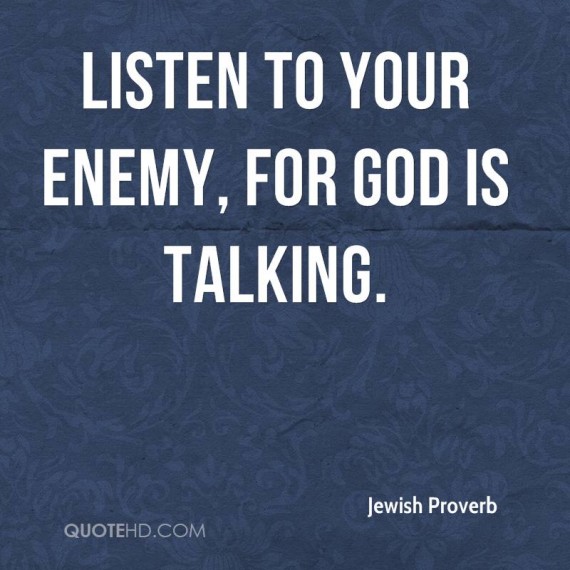In His Sermon on the Mount, Jesus tells us to love our enemies (Matt 5:44).
Since love for enemies is one of the most unnatural things for a human to do, I believe that enemy-love is one of the clearest and most defining characteristics of a true follower of Jesus. Show me someone who truly understands the heart of God, and I will show you someone who loves his or her enemies.
In recent months, I have discovered that one reason we can love our enemies is because they, above all others, might tell us the truth about our actions and behavior.
Normally, we humans tend to gather around us the people who will affirm our beliefs and behavior, and tell us that everything we think, do, and say is correct and loving and godly.
 Of course, it is true what Proverbs 27:6 says, that “Wounds from a friend can be trusted, but an enemy multiples kisses,” but this principle can often be reversed as well, in that friends often overlook our faults and failures because they love us (and maybe because they have the same issues), whereas enemies see through our self-righteous attitudes and hypocritical charades and are more willing to criticize and call us out for our many failures.
Of course, it is true what Proverbs 27:6 says, that “Wounds from a friend can be trusted, but an enemy multiples kisses,” but this principle can often be reversed as well, in that friends often overlook our faults and failures because they love us (and maybe because they have the same issues), whereas enemies see through our self-righteous attitudes and hypocritical charades and are more willing to criticize and call us out for our many failures.
Yet when they do this, we tend to ignore what they say, because we believe they are only saying such things from spite and anger. And maybe they are.
But might there also be truth to what they are saying? If so, could it be that the criticism from our enemy is actually the voice of God to us?
I am reminded of the prophet Micaiah in 1 Kings 22. King Ahab and King Jehoshaphat were planning on going to war against Ramoth in Gilead. So they call all the prophets together to tell them whether their war will be successful or not. They have a parade of prophets — 400 of them — who tell the two kings to go to war against Ramoth, “for the Lord will deliver it into the hand of the king” (1 Kings 22:6).
King Jehoshaphat finds this a little strange that all 400 prophets say the same thing (or maybe they were not all prophesying in the name of Yahweh), so he asks if there is not a prophet of Yahweh around to ask what they should do (1 Kings 22:7).
And I love what King Ahab says. He tells King Jehoshaphat, “Oh sure… there’s Micaiah. But I hate him because he never tells me anything good.”
In other words, King Ahab viewed Micaiah as his enemy. He hated Micaiah.
Nevertheless, they had Micaiah come in, and initially, he agreed with the other 400 prophets in telling the two kings to go to war, for they would be victorious. But King Ahab knows Micaiah better than this (and I imagine that Micaiah’s tone of voice of flippant and sarcastic), so King Ahab says, “Stop lying to me. Tell the truth!” (1 Kings 22:16).
And Micaiah does. And he is the only one who prophesied correctly.
The King’s enemy was the only one who prophesied truth to the King.
I think the same thing is happening today within Christianity.
We have gathered around ourselves teachers who tell us what our itching ears want to hear, and we ignore and silence the prophetic voices who tell us what we need to hear because these prophetic voices come from those many Christians love to hate.
Our enemy is our prophet, but we ignore what he says because he is our enemy.
Like who?
Who is our prophetic enemy?
How about atheists?
Christians love to hate atheists. We feel we do not have to listen to them, because “They don’t believe in God.” They live “secular” lives. They “live in sin.” They “don’t believe the Bible.”
Atheists are prophets for Christianity.
Atheists often point out real problems with Christian theology, Christian practice, and Christian hypocrisy. They often show us how our portrait of a loving God is not very loving, how a God who accepts everybody really doesn’t, and how the values and priorities of many Christian churches and organizations do nothing to help with the real problems in this world.
In my opinion, we Christians fail to listen to the prophetic word from atheists at our own peril.
How about Muslims? Especially Muslim terrorists.
I watch the angry Muslims on TV calling for the death of America and waving signs about “the Great Satan.”
I believe they are flat-out wrong, but at the same time, I have to ask myself, “Why are they saying these things? What have we done to make them think such things about us?”
It is too “easy” of an answer to say that they are just delusional or that they have been lied to about Americans. Certainly they hear lies about us, just as we hear lies about them. But at the same time, we must listen to the complaints they have about American values, American greed, American morality, and American intervention in foreign affairs and recognize that our Muslim “enemies” might be making some good points.
This is especially true when the Christians in American offer full and complete blessings on everything the United States does overseas, including the killing of Muslims and the bombing of cities. Why is it okay for Christian leaders to call for God to bless us in killing our “Muslim enemies” but it is not okay for Muslim leaders to call for Allah to bless them in killing their Christian enemies?
Whatever happened to Jesus instruction for us to “Do unto others as you would have them do unto you”?
How about the LGBTQ community?
When they tell us that we Christians have treated them with hate and contempt, our response is, “No, we haven’t! We’re just warning you about your sin! It is loving to do so. If you don’t repent and change, God will judge you and our nation!”
Their response is, “See? That right there was hurtful. We think our lifestyle is loving, not sinful. Furthermore, it is not right to blame us for all the ill that happens to our country.”
“Well, you’re trying to put Christians out of business!”
“That’s true. Some people are doing that. Just like you Christians have done to us for hundreds of years. Are you saying it’s wrong?”
“Well, it’s wrong when you do it, but not when we do it, because God is on our side. You’re on the side of the devil.”
“That right there was hateful also.”
And the conversation goes on from there. Or more likely it stops.
But I believe that in these sorts of situations, Christians need to stop and listen to the LGBTQ community and what they say about Christian hatred. In this case, they are prophets, bringing to us a revelation from God.
Listening to Our Enemies is One Way to Love Them
In his excellent book, Engaging the Powers (I HIGHLY recommend it!), Walter Wink talks bout the gift of our enemy. He says that our enemies bring us revelations of ourselves that we cannot get from any other source:
These “revelations” (and they are precisely that) need to be treasured, because that is the gift our enemy may be able to bring us: to see aspects of ourselves that we cannot discover any other way than through our enemies. Our friends seldom tell us these things; they are our friends precisely because they are able to overlook or ignore this part of us. The enemy is thus not merely a hurdle to be leaped on the way to God. The enemy can be the way to God (Engaging the Powers, 273).
Do you have someone you consider to be your enemy? Do you know of a group of people that are considered the “enemies” of Christianity? If so, do not seek to harm, discredit, or ignore them. Instead, listen to what they have to say, for their words may in fact be the very voice of God to you and to me.
If you want to hear the voice of God, start by listening to your enemies.





Once again you blow me a way. You are indeed a prophet
Jesus never let the demons talk neither did Paul, just saying
Leo, Yes. Well, this is because the demons are our “true” enemies. Ephesians 6:10-20. No human is a true enemy, which is why we can let them speak into our lives.
Not a prophet. Just a clear headed, rational, non-indictrinated, thinker. Much more rare.
Jeremy, I do agree that those we consider enemies could speak the truth, but that need not necessarily be God speaking truth through them. If an enemy speaks the truth out of hatred or revenge for the one he is speaking to, how can that be the voice of the Spirit speaking through him, for the Holy Spirit is not spiteful or revengeful nor does He speak in the voice of condemnation. Even Satan and his demons speak the truth, but his tone or voice is the voice of deceit, hatred, revenge and CONDEMNATION. Therefore if someone who has enemity towards me speaks the truth but with the intention to harm, hurt, annoy, discourage or CONDEMN or with a hating or revengeful spirit, it CANNOT be God and His Spirit speaking the truth. A clear line has to be drawn between the condemning voice of the enemy (Satan) and the convicting voice of the Holy Spirit.
Glory to God. Amen.
What is God’s purpose in letting us hear and know the truth? It is because He wants to save (deliver) us from our sins and to ultimately save us from eternal destruction into eternal life. If God uses truth to save us, then how does He do it? By DRAWING the sinner to Him ( John 6:44; John 12:32). The voice of hatred, revenge, vindicativeness, condemnation, (even if it is speaking truth), does not and CANNOT draw the sinner to Christ, but only makes the sinner WITHDRAW. Fallen humanity is drawn, and not forced into submission. God is not in the business of condemning the sinner or his conscience ( 1 John 3:20; John 3:17). And Christ did not come to the world to condemn the sinner but to SAVE ( DRAW the sinner to Him). And we are to follow ONLY the truth that is spoken to us by The Holy Spirit although we may hear the truth that the enemy may speak to us. An enemy speaking the truth is not a prophet.
I agree with your post but I also see Rene’s point. I think it takes lots of discernment when considering the remarks from our enemy. Rarely I’ve found, are an enemies criticisms objective.
There are many who want to destroy the Christian faith with venemous attacks rather than constructive comment.
Valuing others for what they can do for us is quite a materialistic argument. It sounds good in communication courses but I wonder if it’s an approach that really stands up in the face of an enemy who inflicts serious violence upon us. Buddhists and Jews take this thinking to extremes: the bodhisattva welcomes suffering as payment for karmic debt while Jews celebrate Satan for playing the role of an adversary through whom they can prove their faith.
I think the wisdom behind this teaching is more Romeo and Juliet, more Sweeney Todd, more a simple admonition against the desire for vengeance, because vengeance begets vengeance and no end of suffering. Common in both stories is the lesson that in seeking vengeance we can kill that which we hold dearest. The barber’s beautiful wife Lucy (light) represents the abused Torah. Sweeney learns the victory of vengeance can be bitter indeed.
Instead of seeking to value our enemy, I suggest that we focus on appreciating our blessings. That’s easier to begin with. Don’t feed your desire for vengeance by focusing energy upon your hurt but rather feed your spirit of love by appreciating the blessings in your life. It’s by freeing ourselves of our pain that we can free ourselves from the desire for vengeance, and eventually even free ourselves enough to love those who have hurt us the most. It’s a vitally important spiritual journey. We don’t need to value our enemy for the “blessings” they bring us, like some kind of masochists, but when we free ourselves of pain we can free ourselves enough to love our enemies. Meditate on your blessings, your friends and family, opportunities and cherished memories, and most importantly of all, the love of God.
Hi Jeremy — I’ve thought about this reality on occasion. I know that God is light; and in Him there is no darkness (1 John 1:5). And “if we walk in the light as He Himself is in the light, we have fellowship with one another, and the blood of Jesus His Son cleanses us from all sin.”
So, if we have the light of God in us, the Spirit certainly indwells us. If the Spirit indwells us truly, He is not willing to share His space with the devil (or the devil’s influence). One cannot consciously embrace darkness and the Holy Spirit. If we are in darkness we can possess hate. If our temples/bodies are warm and inviting dwellings for evil, that’s the real problem. Therefore, God is not saying we should be docile and passive about evil; but that we should be a vessel that makes hate/evil uncomfortable in us. In other words, if someone (God forbid) came to break into my house for the purpose of killing and destruction — I would do whatever was called for to stop that attack (for that reason a perpetrator would find a serious challenge if he picked my house); but I wouldn’t hate him — not for an instant. Thus I don’t focus on whether or not I hate my enemies; I focus on whether or not I am capable of possessing hate in any manner for any reason. If I find that I do have openings for hate; I pray it away before it can potentially manifest and perhaps catch me off guard. We all have our shortcomings, for sure; but that particular thing was never one of mine — I tended to see people as innocent until proven guilty. I have learned, as is my brother’s instinct, to see people, at times, as guilty until proven innocent.
Very thought provoking! In all things be decerning and prayerful. Be open to what God is doing, because God will even use a donkey “ass” if he needs too get His message to you.
I agree. And the message that ALL of the “prophets” (the ones you mention) have in common is something-like ‘the differences between us don’t matter (when we pass away … they might matter now because they make interaction less-comfortable; but after that, peace goes on!)’
But ministers like Franklyn Graham (son of Billy, president of BGEA) won’t hear that (as I discuss on my website).
Can what a Muslim terrorist (who’s trying to justify his killing of people) says to me about my conduct as a Christian edify me? Maybe. Maybe not
.
Can what a homosexual (who’s trying to justify his behaviour) says to me about my conduct as a Christian edify me? Maybe. Maybe not.
Can what an atheist (to whom God is non existent) says to me about my conduct as a Christian edify me? Maybe. Maybe not.
One thing is sure though, you can’t call what these set of people say “prophetic” – that’d be a big misuse of the word! I believe “prophetic” means “divinely (that is, by God, inspired”.
The girl with a demon that pestered Paul for “many days” in Acts 16 was speaking “the truth” – that doesn’t mean it was “prophetic”!
Bottom line, these “voices” may well be revealing our faults to us, but I doubt they are faults we didn’t already know or that won’t be revealed to us if we submit/listen totally to the Holy Spirit.
The Holy Spirit remains the ONLY “voice” that can draw us (Christians) to God and mould us into the image of God’s son (Romans 8:29) – not that of an atheist, Muslim terrorist, homosexual or any other.
Great piece, Jeremy.